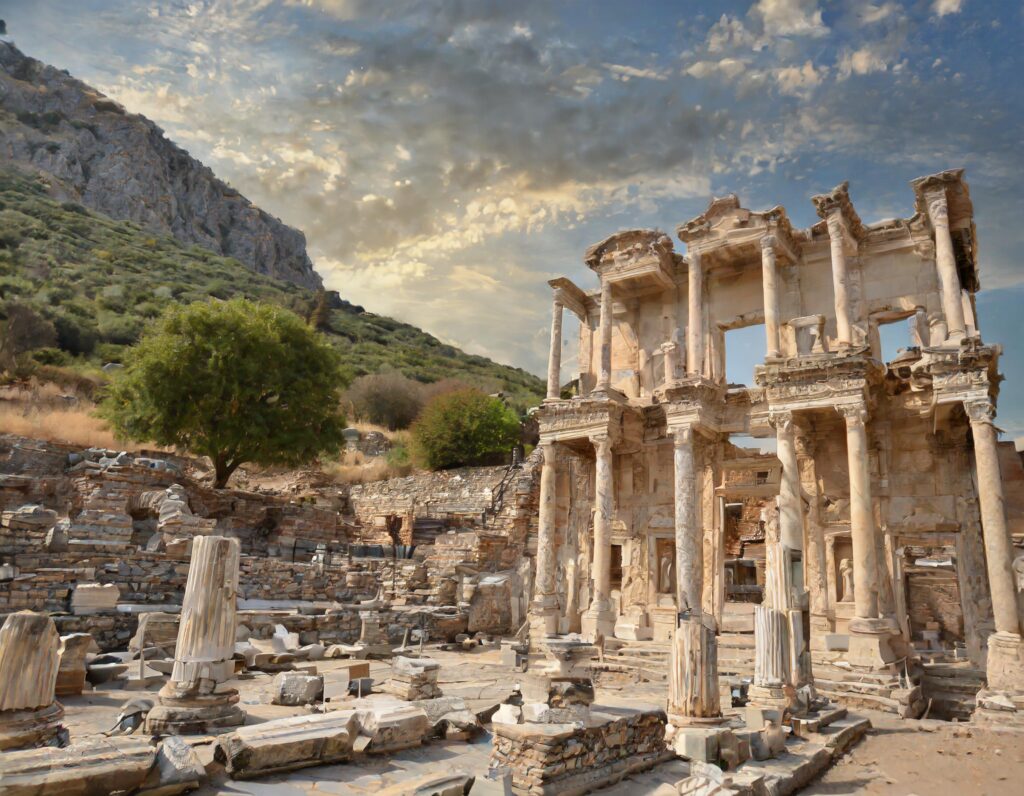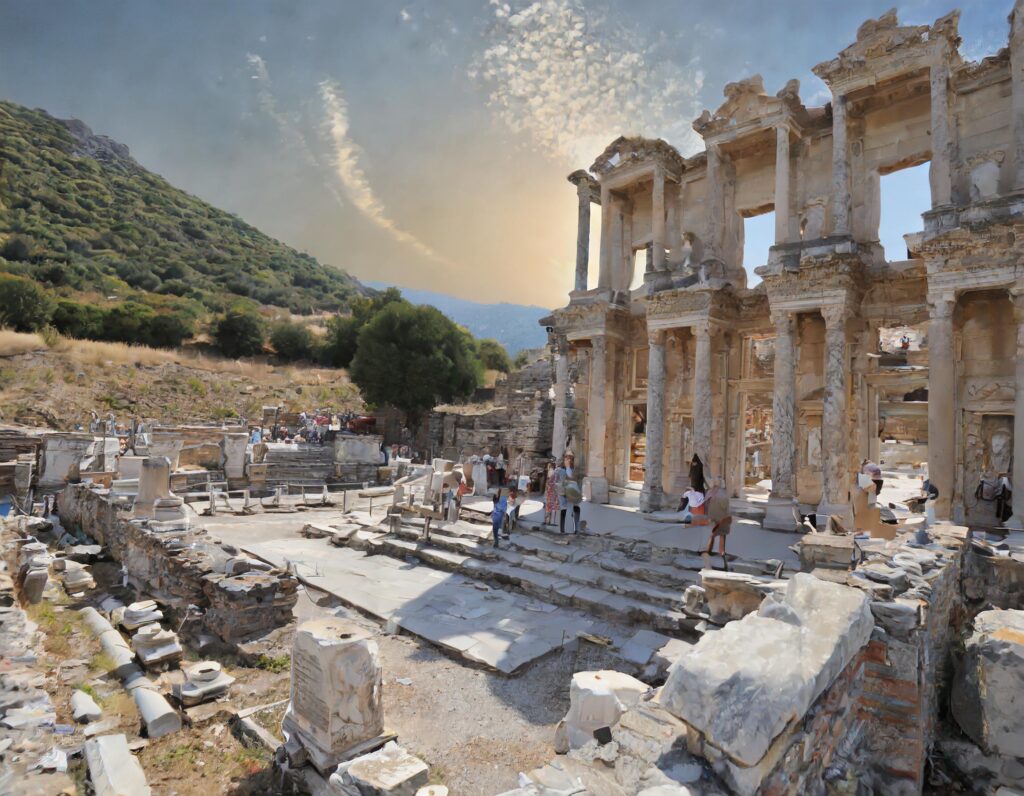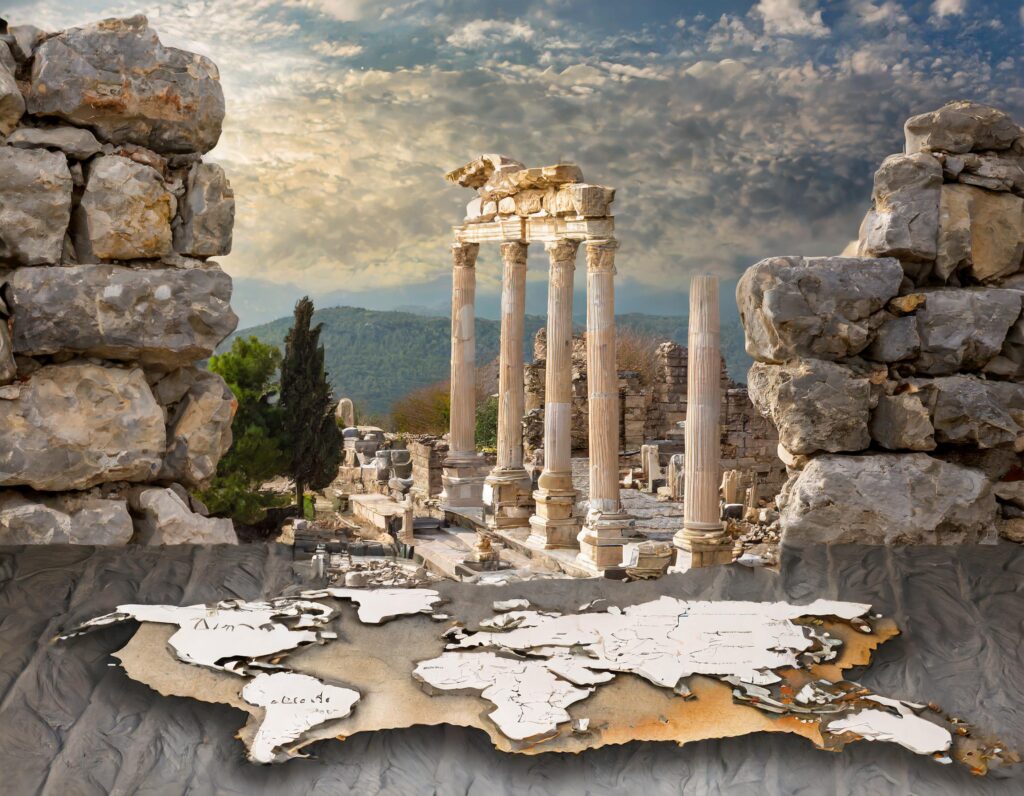Ephesus History:

Ephesus, located in present-day Turkey, holds a significant place in history as one of the most prosperous cities of the ancient world. Its origins trace back to around 6000 BCE, making it one of the oldest settlements in the Mediterranean region. However, Ephesus truly flourished during the Classical Greek and Roman periods, reaching its peak around the 1st and 2nd centuries CE. It was a major center of trade, culture, and spirituality, serving as the capital of the Roman province of Asia.
Throughout its history, Ephesus experienced various conquests, including Persian, Macedonian, and Roman rule. The city’s prosperity was fueled by its strategic location along the Aegean coast and its bustling port, which facilitated trade with other parts of the Mediterranean and beyond. Ephesus was also renowned for its magnificent architecture, including the Temple of Artemis, one of the Seven Wonders of the Ancient World, and the grand Library of Celsus.

Despite its glory, Ephesus faced gradual decline due to factors such as changes in trade routes, earthquakes, and the silting up of its harbor. By the 15th century, Ephesus was largely abandoned, and its ruins lay hidden for centuries until archaeological excavations began in the 19th century, uncovering the splendid remnants of this once-great city.
Ephesus Attractions:

Ephesus boasts a wealth of attractions that offer visitors a glimpse into its rich history and architectural wonders. One of the most iconic landmarks is the Library of Celsus, an ancient Roman building that served as a monumental tomb and library. Its meticulously restored facade is a testament to the grandeur of Roman architecture.
The Temple of Artemis, dedicated to the Greek goddess of hunting, was another marvel of the ancient world, although only a few columns remain standing today. Nearby, visitors can explore the ruins of the Ephesus Theatre, one of the largest ancient theaters ever built, with a seating capacity of up to 25,000 spectators.
For those interested in spirituality, the House of the Virgin Mary is a sacred site believed to be the final residence of Mary, the mother of Jesus. Pilgrims from around the world visit this serene spot to pay their respects and seek blessings.
The Ephesus Archaeological Museum provides further insight into the city’s history through its impressive collection of artifacts, including sculptures, pottery, and jewelry unearthed from the ancient ruins.
Ephesus Tours:

Embarking on a guided tour of Ephesus is the perfect way to immerse oneself in its fascinating history and archaeological wonders. Several tour operators offer comprehensive packages that cover key attractions such as the Library of Celsus, the Temple of Artemis, and the Ephesus Theatre.
Expert guides provide insightful commentary, shedding light on the significance of each site and sharing captivating stories from Ephesus’s past. Visitors can explore the well-preserved ruins at their own pace, marveling at the intricate carvings, majestic columns, and sprawling city layout.
Additionally, some tours offer exclusive access to hidden gems within Ephesus, allowing travelers to discover lesser-known sites and gain a deeper appreciation for the city’s cultural heritage. Whether it’s a half-day excursion or a full-day adventure, a guided tour ensures an enriching and memorable experience in Ephesus.
Ephesus Map:

Navigating the ancient ruins of Ephesus can be an exciting yet daunting task, given the vast size of the archaeological site. A detailed map is essential for planning your visit and maximizing your exploration of this historical treasure trove.
The Ephesus map highlights key landmarks, pathways, and points of interest, enabling visitors to chart their course through the city’s streets and squares with ease. It also provides useful information such as restrooms, visitor centers, and picnic areas, ensuring a comfortable and enjoyable experience for all.
By consulting the Ephesus map beforehand, travelers can create their own customized itinerary, prioritizing must-see attractions while allowing time for leisurely strolls and spontaneous discoveries. Whether you’re a history enthusiast, an architecture aficionado, or simply a curious wanderer, the Ephesus map is your indispensable companion for unlocking the secrets of this ancient marvel.
Ephesus entrance fee

- Standard Entrance Fee: As of the last available information, the standard entrance fee for adults (ages 18 and above) is around 40 EUR. This fee grants access to the main archaeological site of Ephesus, including key attractions such as the Library of Celsus, the Temple of Artemis, and the Ephesus Theatre.Also you’ll have a access to Experience Museum.
- Reduced Entrance Fee: For Foreign people haven’t any reduced entrance fee.
- Free Admission: Children under a certain age, usually around 0-6 years old, may be eligible for free admission to Ephesus. However, this can vary depending on the specific policies in place at the time of visit.
- Special Passes or Packages: Some visitors may choose to purchase special passes or packages that include entry to multiple attractions in the region, such as Ephesus, the House of the Virgin Mary, and the Ephesus Archaeological Museum. These bundled passes may offer cost savings compared to purchasing individual tickets for each site separately.
- Guided Tours: Visitors opting for guided tours of Ephesus may find that the entrance fee is included in the overall tour price. In such cases, the cost of entry is typically factored into the total tour package, which may also cover transportation, guide services, and additional amenities.
It’s important to note that entrance fees and policies can change over time, so it’s advisable to check the latest information from official sources or tour operators before planning your visit to Ephesus. Additionally, currency exchange rates may fluctuate, affecting the equivalent cost in other currencies.




